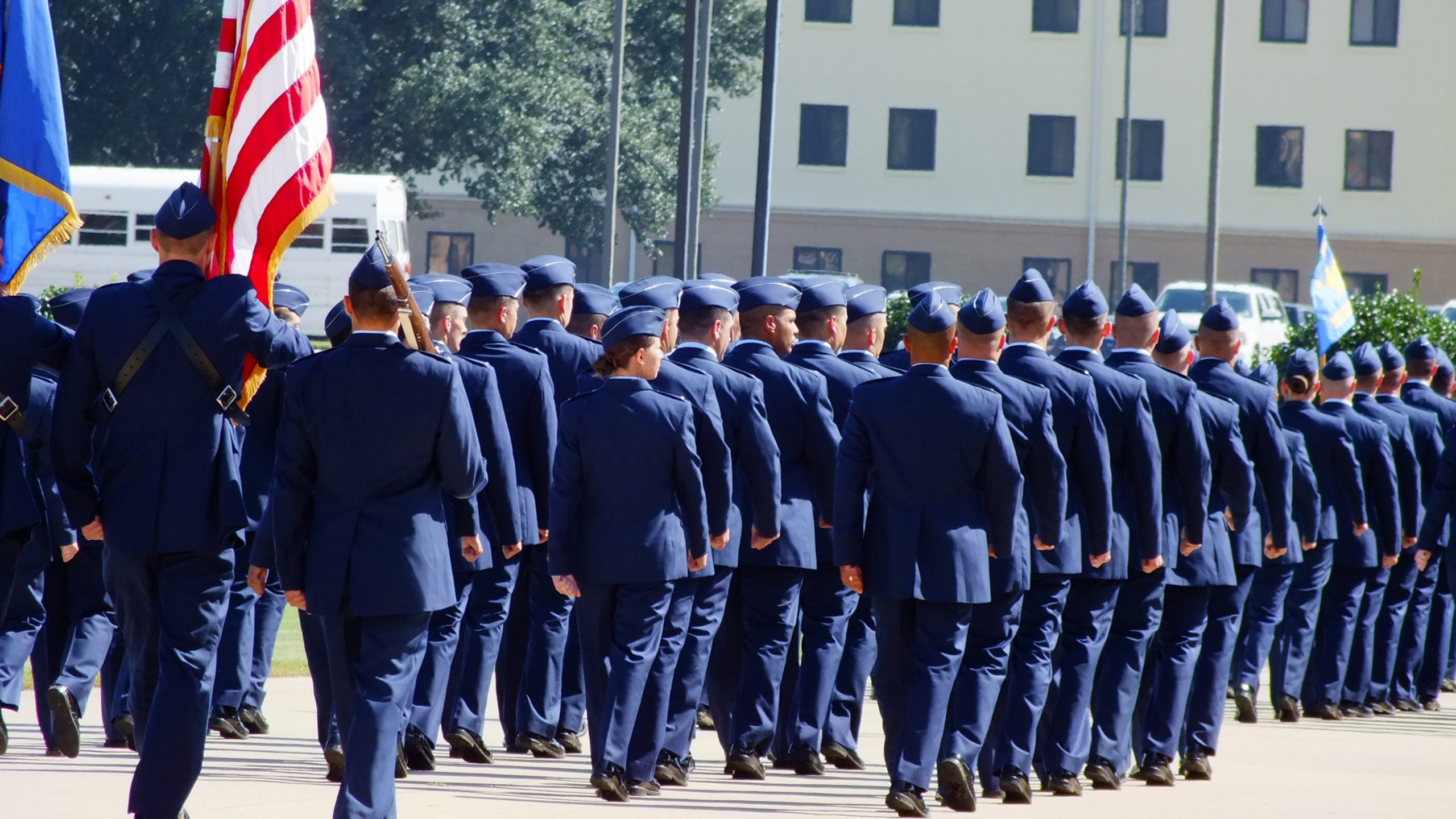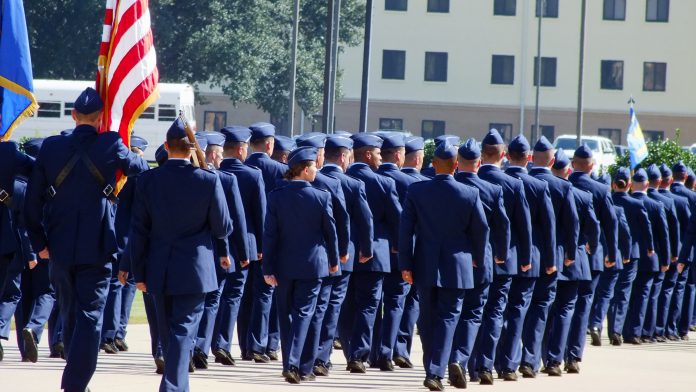Get yourself a sweatshirt from the campus book store, and order up a special backpack- your family is going back to school!
Getting a masters degree or PhD is a huge deal. Even better news – this is a full time paid job, and the military is footing the bill for your education. Cha-ching!

There are so many benefits to attending Air Force Institute of Technology (AFIT), Command and General Staff College (CGSC), or Naval Postgraduate School(NPS), but it’s also a totally different experience than so many other graduate schools or military assignments. My spouse completed his masters, PhD, and is now a professor at AFIT; by the time we move again, we will have spent almost 9 years at the school house at Wright- Patterson AFB. Neither of us were fully prepared when we arrived the first time but when we returned for his PhD assignment, all of the little nuances of this unique assignment came flooding back.
So I’m here to do what any military spouse does for those who come behind them – pay forward some knowledge so that it doesn’t smack you upside the head like it did me!
Here are some of the things I’ve learned during our many, MANY years at a military postgraduate school!
– AFIT/NPS operate on their own calendars.
They are on a quarterly system, and have to maintain accreditation as a graduate school by having so many student contact hours. That means that what goes for the rest of the base doesn’t necessarily apply to AFIT/NPS. Does the installation have a family day to extend a three day weekend into a four day weekend? It probably doesn’t apply to you or your spouse.
So stop making long weekend vacation plans, find the academic calendar, and print it. Hang it on the fridge. Save it to your phone. Clip it in your planner. Mail it to your family and your spouses family so that you can explain to them why that family reunion this summer might be out.
I can’t tell you how many times I tried calling for a medical appointment or attempted to run to a particular office on base only to find that it was a down day for everyone except AFIT. This applies to holidays as well; the day after Thanksgiving isn’t a given. Instructors try to give students a break from class, but if they are behind on material or feel they need to go over a topic again before finals, they can and will hold class that Friday. Students will have a week off of class between quarters and two weeks around the winter holidays. But usually there is still work to be done on their dissertation or thesis, and advisors think of these breaks from class as the perfect time for their students to get ahead on research. True time off is simply hard to come by.
The upside of this? They will have so much leave in the bank when they leave the school. You can take a nice, long family trip en route to your next duty station to get reacquainted when school is done.
– This can be the best time or the worst time to expand your family.
I’ve often heard people say that they decided to add a child to their family while at AFIT/NPS because there wouldn’t be a deployment and students can sometimes choose to work from home a large part of the assignment. While this is true, it’s equally true that any of the maternity/paternity leave that they take is at their own risk. Classes don’t stop because you have a baby. While most instructors will give you as much leeway as they can, any work that is missed will have to be made up.
I can’t tell you how many people I know whose spouse was with them in the delivery room but was sprinting to get to class right as mom and baby were moving to a recovery room.
I say this to say- don’t let being at NPS/AFIT weigh too heavily on whether or not to have a baby. As with any job, there are costs and benefits and what seems like perfect timing to one family doesn’t equate to that for another.
– Students are sheltered from deployments, but faculty and staff are not.
I served as key spouse the first time we were at AFIT and was surprised to find out how many staff were deployed. In my experience, there is very limited support for families during deployment from a school house unless you actively seek it out. If you are there as a student, be sensitive to that topic when you’re at events. Don’t make the assumption that nobody is going through a separation. Deployments are hard enough, but they are harder when it doesn’t feel like that is even seen as part of the mission.

– Get involved with your own activities as your life allows.
For some people, that’s working. The masters program is only an 18 month assignment, though, so there are a number of spouses who decide to skip working and instead work on advanced degrees themselves. There are also many chances for volunteering, whether it’s with a group from the installation, or your church, or something you’re personally interested in.
The first time my spouse attended AFIT, I chose to volunteer with a number of different groups in the area that all interested me in different ways: building auction baskets as a fundraiser for the Fisher House, giving museum tours with a base-wide spouses group, and organizing activities for the AFIT spouses association. I was never home, he was always home studying, and it worked out great.
By the time we returned for him to complete the PhD program, we had two young children and time was much more limited. Instead, I searched out the playgroups, zoo passes, and squeezed in some time to start running again.
Do what makes you happy. It is different for everyone. However, the bottom line is, if you are sitting and waiting for your spouse to get home at the end of the day as your only source of entertainment or adult human interaction, you are probably going to be pretty lonely and bored.
– When I attended my first spouses orientation at AFIT, the commander told us all to act like our military member was deployed and to consider any time we saw them to be a gift.
While I don’t fully agree with that, I think the overall message was worth listening to. The academic program that they are beginning is rigorous and fast paced. Nights and weekends don’t hold a lot of meaning, and the military member isn’t trying to neglect or ignore you intentionally. That said, you need to decide what the non negotiables are for your family. Maybe it’s family dinner every night, or they do school pick up since they don’t have class at that time. Getting an advanced degree isn’t a pass to completely disappear.
It can be a really hard season on marriages, and it’s going to take effort and grace on both spouse’s parts to make it work. Relationships aren’t 50/50 all of the time, and maybe your balance shifts to more like a 30/70 ratio for awhile. My advice, though, is to not let it dip into one person giving 5% effort while the other person carries 95% of the load. It only leads to resentment.
– The military member will still have to pass a PT test.
I know, I know, why am I mentioning this? We’re dealing with adults who are responsible for their own selves, right? I totally support that stance and am not saying to parent your spouse. I’m just saying, maybe invite them to take a 30 minute brisk walk a few days a week, ya know?
It’s easy to get really wrapped up in academic studies, and everyone knows the combination of stress, late nights spent studying, and possibly being sedentary as you do computer work isn’t the best for naturally maintaining an active lifestyle. The number of students who fail and have to retake PT tests while in school is…well, it’s high, OK? If you can avoid that extra stress (or help your spouse to), it’s worth it.

– The workload and time commitment will vary to a degree based purely on which program the student is in.
Some students will work diligently and find their program to be challenging but not stressful. Some students will work day and night, lose hair, and emerge from their lab/office looking 20 years older. And yes, some students are unable to complete their degree and leave to their next assignment with a “did not complete” training report. None of these things are indicators of the goodness of the person, the value they have in your family, or how much they love you.
This academic program feels like do or die, and that can weigh really heavily on a person. Keep in mind this assignment will end, and win or lose you will move on to a new adventure at some point. Or, you’ll wind up back as faculty and never escape! Oh wait, maybe that’s just my feelings on the matter.











